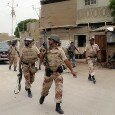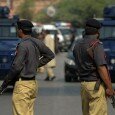By Irfan Khan –
A look at the underpaid, overworked and exceptionally brave men of the bomb disposal squad of the KP Police
Words like IEDs, suicide vest, mortar shells have entered the lexicon of the common man in Khyber Pakhtunkhwa and pronouncing them seems to be no oddity now. Yes, things have been bad in the terrorism-hit province. But they could have been far worse were it not for the brave men of the Bomb Disposal Squad (BDS) of the Khyber Pukhtunkhwa Police. This is their story. These men are paying the price of their valour, on the job and off it, being targeted themselves. But they refuse to step back.
Despite technological advancements, finding an IED buried in the ground and diffusing it is an uphill task, even today. This was experienced by the BDS while working along the dusty Frontier Road, which links Shikhan village with Kohat Road. For this is where its district chief, Hukam Khan, fell victim to a bomb blast. The road itself is a boundary line between the Khyber Agency and Peshawar district, so it is easy for the militant outfits operating in the Khyber region to infiltrate into the settled district, target convoys of security forces and law enforcement agencies and slip back into the safety of their safe havens.
These attackers mostly use motor bikes and are equipped with AK-47 rifles, powerful homemade hand grenades, RPG-7 rockets and even remote controlled IEDs.
Their favourite technique is pressure cooker bombs which are buried in the ground and attached to a remote controlled device.
Keeping the Frontier Road open and safe is a matter of utmost importance for the law enforcement agencies and in the past four months more than 20 powerful remote controlled bombs have been destroyed here. Two of the bombs went off in which the late SP Khurshid escaped unhurt. BDS district chief Hukam Khan was not that lucky. When he was killed, militants had planted four bombs near each other and the idea was to detonate them once the first bomb explodes and the police is gathered around the site of the explosion.
When (Hukam Khan) was killed, militants had planted four bombs near each other and the idea was to detonate them once the first bomb explodes and the police is gathered around the site of the explosion
“I still remember the day. It was 28th September and we had received information that militants had been spotted in the area a night earlier. They were digging the ground and burying something which we thought could have been IEDs,” recalled an eye witness constable Ijaz Khan of Badabher police while talking to your correspondent.
“We closed the road and called the BDS team because the devices had been buried in the ground,” he explained, adding that there were frequency jammers installed in the police vehicles and no one could even imagine that a remote controlled device could be exploded in their presence.
“Hukam Khan was the chief and he was searching the area with the help of metal detectors. Then he saw a pile of bricks, approached it, inspected it and said that that there was a bomb under the pile. No sooner than he had completed his sentence that a powerful explosion occurred, tearing him to shreds,” added Ijaz.
After the blast Lashker-e-Islam (LI) activists started firing at the police party so as to prevent them from diffusing other three bombs later found and diffused by the another team headed by AIG Special Branch and head of BDS, Shafqat Malik.
“My team of 67 men is bearing the brunt of the on-going war in the region despite our limited resources. We have been provided with modern equipment like remote-controlled robots which are operational but these are not tailor-made solutions,” explained AIG Special Branch Shafqat Malik.
He said that these robots have been developed for use in an urban environment while most of the bomb attacks are taking place in the suburban hinterlands of the district.
 “These robots could inspect a motor car or a visible explosive device and attach another explosive charge with it so as to destroy it out to a 100 meters but you cannot expect them to dig the ground and find a bomb for you and destroy it, modern technology still has its limitations,” he argued, adding that Radio Frequency (RF) and GSM jammers could prove valuable but his team has not been provided with any jammer by the government despite repeated demands in this regard.
“These robots could inspect a motor car or a visible explosive device and attach another explosive charge with it so as to destroy it out to a 100 meters but you cannot expect them to dig the ground and find a bomb for you and destroy it, modern technology still has its limitations,” he argued, adding that Radio Frequency (RF) and GSM jammers could prove valuable but his team has not been provided with any jammer by the government despite repeated demands in this regard.
“We need jammers of US or European origin and at least 50 jammers of each type are required to equip my team in the 25 districts of the province,” he explained.
He said that risk allowance to the tune of 60 percent of the salaries of the staff was being paid to Islamabad and Sind-based BDS members but his men receive no such income supplement. They have also not been provided with insurance cover against death or disability either, which was their basic right.
Although effectively doing their job within limited resources, the BDS team in Peshawar is a depressed lot as a whole. They pass through periods of extreme stress. They use a darkened hall as living space inside the Gul Bahar police station where there is no alternative power source
Sniffing dogs could prove effective in an environment where all machines and men fail and BDS do have a pair of trained dogs procured for Rs7 lakh (roughly, $7000). But one pair cannot be used everywhere so it has been assigned the task of VIP duty related to chief minister and other ministers only.
“I would like to have more dogs, which are really effective as compared to men and machines but, again, we have very limited financial resources, which is the main hurdle in the procurement of these animals. They are really expensive,” added Shafqat.
Although effectively doing their job in limited resources, the BDS team in Peshawar is a depressed lot as a whole. They pass through periods of extreme stress and tension while diffusing bombs and they are over-burdened as well.
They use a darkened hall as living space inside the Gul Bahar police station where there is no alternative power source like a UPS or generator available in the case of load shedding, which could prolong to more than 5 hours at a time in the hot months of June and July. In this hall, every member has a single bed regardless of his position and rank and a trunk provided officially in which he could keep his clothes.
There is no official food or any entertainment available to these men.
“We lack even a TV set. We cannot sleep in the night due to load-shedding and in the morning are called to inspect a car suspiciously parked outside a plaza. There is no money in this field either,” said a senior member of the BDS, Abdul Haq, adding that all members of the BDS should be completely stress- free
“If you diffuse a hand grenade in Punjab you get a reward of Rs5000 for it, which is lucrative financially but there is no such thing in this province and city. I have diffused hundreds of hand grenades, land mines, timed and remote controlled devices but there is no recognition for my work,” he explained.
Abdul Haq had joined the BDS in the year 1986 after a retired army official, Major Ghulam Hussain, was hired by the police and assigned him the task of forming a bomb disposal unit in the province.
 Recalling those bygone days in the initial period of the BDS, another retired BDS official, Khurshid, said that those were the golden days of their lives. “I myself, Abdul Haq and the late Hukam Khan were constables in the police and had been sent to work under Major Ghulam Hussain. We were young and wanted to learn besides there were a lot of American equipment pouring in so ours was one of the most well equipped teams in the country,” he explained, adding that after the Afghan war, people had started using anti-tank and anti-personnel mines to target their opponents especially in the Malakand region and theirs was the only specialized team in the entire region to find and diffuse mines.
Recalling those bygone days in the initial period of the BDS, another retired BDS official, Khurshid, said that those were the golden days of their lives. “I myself, Abdul Haq and the late Hukam Khan were constables in the police and had been sent to work under Major Ghulam Hussain. We were young and wanted to learn besides there were a lot of American equipment pouring in so ours was one of the most well equipped teams in the country,” he explained, adding that after the Afghan war, people had started using anti-tank and anti-personnel mines to target their opponents especially in the Malakand region and theirs was the only specialized team in the entire region to find and diffuse mines.
“But with the end of the war in Afghanistan, the growth of the BDS came to a standstill. Major Ghulam Hussain retired and the provincial government and police paid no attention to our unit. There was no fresh course and no new equipment. We even lacked vehicles,” he explained.
Replying to a question, he said that one cannot compare the ongoing war with the Afghan war days of 1980s.
“Those were the days of simple, timed devices and we were well equipped to cope with the situation. But now terrorists have introduced remote-controlled bombs and, most importantly, human bombs which are very difficult to tackle,” added Khurshid.
BDS personnel complain of an awful work-life balance. “People have been asked to inform the police if they see any suspicious thing and whenever they see a car or anything else, they call the police. So we are told to reach the area and inspect it. We receive at least 10 to 18 calls on a busy day, which means that we are highly over-burdened,” said Abdul Haq.
The BDS has been provided by U.S. and U.K. governments some forensic labs, portable x-ray machines, blast proof suits which could withstand a small intensity explosion and complete kits consisting of equipment used in the diffusing of IEDs. But due to the sophistication of terrorists’ methods, a lot of other equipment is required which needs millions of rupees currently not available to the BDS.
“Look at the techniques of these militants. They are manufacturing booby-traps, which are very difficult to neutralize. They have produced their own, more powerful hand grenades and they can turn a truck or car into a bomb, not to speak of their trade mark techniques of suicide bombings,” said Shafqat.
“I salute my brave men who are fighting this war without inviting much appreciation from the government, police or even public.”
These under-paid and over-burdened people are the real heroes as without their presence you cannot fight this war, he added.
“We are short of officers including DSPs, SPs and Inspectors but there is no deficiency in our performance,” he added.
The writer is a freelance journalist based in Peshawar.






























































































